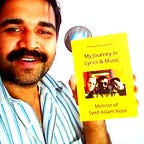How a Twitter hoax almost gave me a heart attack
On May 4, at 9:35 pm, as I was having my dinner, I received four back-to-back Whatsapp messages from my friend Shri Kant Yati. He sounded extremely stressed and asked about Lucky Ali Sir.
The question took me by surprise as there was no reason to be alarmed. Fans now have the privilege to get regular updates from the legend and even directly interact with him through Facebook.
“He is fine, active on social media,” I replied.
He informed me about the rumors doing rounds on Twitter. I immediately went to the micro-blogging site and saw the hoax gaining momentum.
My heart skipped a beat. I immediately called Meezaan Ali, Lucky Ali Sir’s nephew, and asked him about Sir’s health. He replied everything is fine. We talked for about half a minute.
After hanging up, I immediately informed Shri Kant and went to my Twitter account to write some replies to the people who tweeted the misinformation. I also saw some tweets that made me extremely sad.
Death hoaxes of well-respected and admired people have a devastating impact on their admirers. I learnt it the hard way that evening. In the recent past many celebrities have fallen prey to rumors, including Amitabh Bachchan, Ayushman Khurrana, Nick Jonas, veteran actor Mumtaz, legendary singer S Janaki. More recently Ramayan’s actor Arvind Trivedi, social media star Kaashh’s Ashaley, veteran actress Tabassum.
Pranksters are using Twitter and other social media platforms to spread fake news probably to drive traffic to websites or social media pages and, maybe, earn some bucks by monetizing their content and clickbait tricks. The twitter trend has enabled fake news to spread like wildfire and give the worst shock and trauma to fans and admirers, before they are countered. But at the same time, they can be even more damaging for the pranksters and can put them behind the bars.
How not to fall for fake news
I was fortunate to have the number of Meezaan bhai, which enabled me to call him and know the truth. But it may not be possible for everyone to contact a credible source (in every instance when a piece of information is circulated) to confirm the veracity of a piece of information. If it was not Lucky Ali Sir but someone else I have great respect for, I won’t know for sure until and unless it gets reported in national media. In the past few days, there have been so many hoaxes and fake news that it is crucial for us to distinguish fake news from real, only if we care so much. We can do so by:
Paying attention to where the news is coming from: We can’t be sure of the credibility of the news if it’s only trending on social media and not circulated by any reliable source.
Checking the originating source (if possible): While getting a piece of information on social media, it’s better to try and check the originating source. Has it been tweeted or posted by any credible figure? Has it been retweeted from their account?
Checking the news from a variety of sources: “Has it been reported on any other source?”
Controlling emotions: Easier said than done. But keeping calm is the best thing we can do for ourselves.
Using some credible source to know the truth (only if possible): Nothing better than calling up a known contact, exchanging pleasantries (works fine even when feelings are running high), and asking about if the news is correct or not.
Not sharing until and unless the news is confirmed.
Correcting friends when we see them share the wrong information.
There are also laws to control fake news, especially in the case of death hoax and misinformation that can harm the reputation of an individual. Anyone who makes or publishes any imputation concerning any person intending to harm, or knowing or having reason to believe that such imputation will harm, the reputation of such person is liable for defamation which is punishable under section 499 and 500 of the Indian Penal Code.
